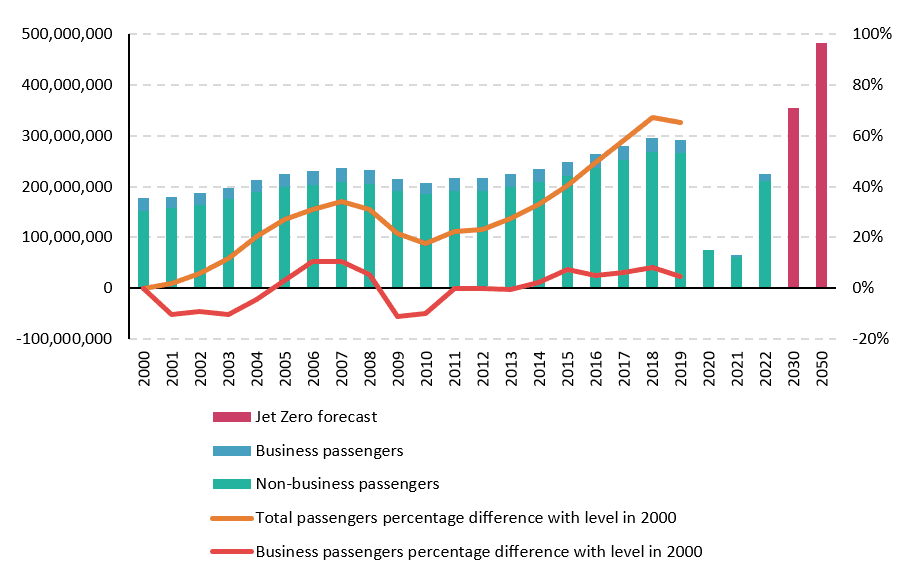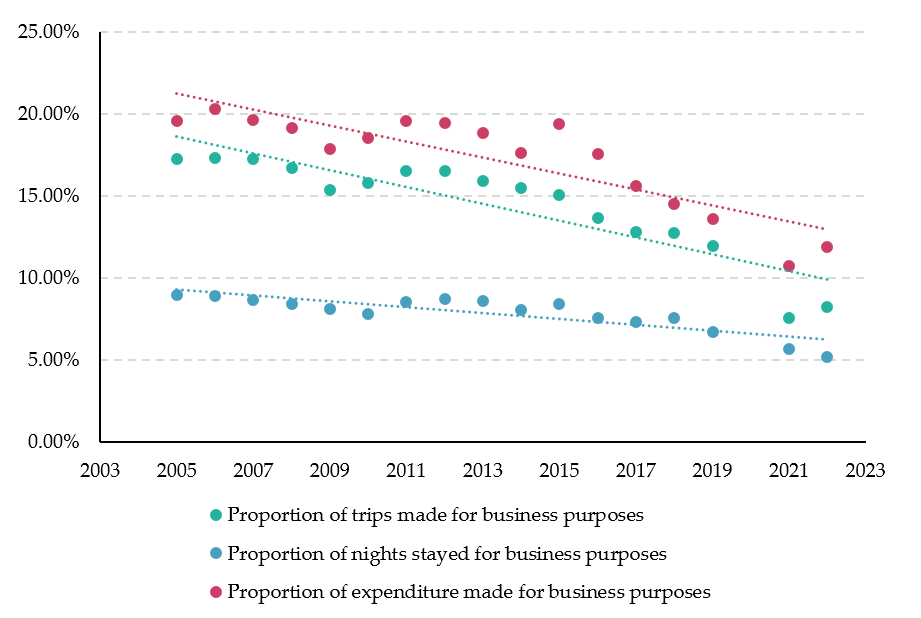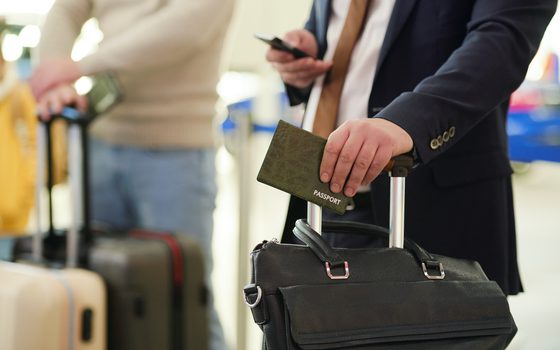Boom in air travel fails to increase UK productivity or GDP growth
Aviation industry and government claims in doubt as peer-reviewed report finds sector has some of the lowest job and value creation potential
17 July 2023
- No strong evidence that increase in UK air travel results in increase in productivity or GDP growth.
- Despite huge growth in passenger numbers 2015 – 2019, proportion of passengers flying for business in 2022 was half what it was in 2013.
- Number of air transport jobs is lower today than in 2007, and the sector has some of the lowest job and value (gross value added) creation potential in the UK.
- Air transport real wages have seen biggest post-financial crisis decline of any sector in the country.
- £32bn (net) left the UK in 2019 through more UK tourists travelling abroad than foreign tourists visiting.
The boom in air travel since 2015 has failed to increase UK productivity of GDP growth, according to a comprehensive, peer-reviewed report from the New Economics Foundation (NEF), published today.
The NEF report is the first comprehensive analysis of the economic costs and benefits of the UK air travel sector since the government published the Aviation Policy Framework a decade ago. It casts doubt on the aviation industry’s claims that growth in air travel boosts the UK economy, which relies on the assumption that more air travel will result in more business travel. The report finds that business use of air travel has collapsed in the last decade, with just one in 12 flights now taken for business purposes, down from one in six in 2013.
The report finds that the UK’s ballooning air travel industry is creating a travel spending deficit which sees £32bn more flowing out of the UK through outbound tourism than flows in through foreign visitors. This cash drain is felt exclusively outside of London and south-east England, exacerbating the UK’s regional inequality and damaging the domestic tourism sector.
The report shows that, despite a rapid increase in passengers between 2015 and 2019, the amount of jobs in the air transport sector has declined since 2007, and the sector is one of the poorest job creators per pound of revenue, with wages lower than they were in 2006. Despite growth in productivity, the sector has seen the biggest post-financial crisis wage decline of any sector, the report finds.
The government’s Jet Zero strategy aims to deliver a net-zero emissions air travel sector by 2050, but allows for unlimited growth in flying. It forecasts over 200 million more passengers a year by 2050. In this unrestricted climate, at least nine airports across the UK are attempting to expand. Bain & Co. consultancy recently echoed the Climate Change Committee and found that airlines will be unable to meet their net-zero requirements without reducing growth in air traffic.
Luton Airport are midway through a development consent order application to expand by an additional 14 million passengers a year. Earlier this month Gatwick Airport formally submitted their application for an additional 13 million passengers a year.
The report recommends that the government pause all growth in air travel, including airport expansions, until it has conducted a comprehensive, independent review of the economic evidence of expanding the UK’s air travel sector, and the compatibility of air transport growth with policies on climate change, levelling-up, and domestic tourism.
Dr Alex Chapman, senior researcher at the New Economics Foundation (NEF), said:
“For years, this government has let the air travel industry balloon in size, based on dangerously outdated claims that it is boosting the UK’s economy. The reality is declining business air travel, declining wages for air travel workers, declining job numbers, and declining domestic tourism spending in the UK. And that’s before you consider the rise in noise, air pollution and dangerous emissions driven by UK airports. So who exactly is benefitting from ever more air travel? You needn’t look much further than the highly paid executives, the private shareholders, and the wealthy minority of ultra-frequent flyers.”
Notes
The New Economics Foundation is a charitable think tank who are wholly independent of political parties and committed to being transparent about how it is funded.
The report, Losing Altitude, is available at https://neweconomics.org/2023/07/losing-altitude
The report was peer-reviewed by leading UK transport economics expert John Siraut, Chair of the Transport Economics Committee of the European Transport Conference.
The report analyses secondary data gathered exclusively from official government sources, the Office for National Statistics, and the Civil Aviation Authority. Key trends in air travel are shown in Figures 1 and 2.
Information on the Luton Airport expansion can be found at: https://www.bbc.co.uk/news/uk-england-beds-bucks-herts-64801427
The recent Bain & Co. consultancy report on air travel emissions can be found at: https://www.bain.com/about/media-center/press-releases/2023/airlines-can-eliminate-up-to-70-of-emissions-by-2050-but-many-will-miss-their-net-zero-goals-if-air-traffic-continues-to-grow-faster-than-gdp/
Figure 1: Air passenger numbers in the UK, their trend, and change compared with 2006, including 2030 and 2050 forecast passenger numbers in the 2022 Jet Zero Strategy. Business passenger data is not available from 2020.

Figure 2: Trends over time in three measures of the UK business air travel market.

Source: NEF analysis of ONS Travelpac
Campaigns Stop airport expansions
Topics Climate change Transport Environment






